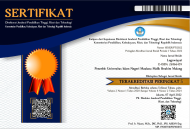The Effectiveness of Song Translation In Increasing Vocabulary To Develop Speaking Skills At SDN 1 Paciran
Abstract
Keywords
Full Text:
PDFReferences
Al-Ansi, A. M., Suprayogo, I., & Abidin, M. (2019). Impact of Information and Communication Technology (ICT) Investment on different Components of Human Development in Developing Countries. Science and Technology, 9(2), 19–28. https://doi.org/10.5923/j.scit.20190902.01
Al-Furqaan, D. L. (2023). DENI CAK NAN - LOSS DOLL (ARABIC VERSION). Youtube.Com.
Anam, S., Lestari, D., & Awalludin, A. (2020). Efektivitas Metode Bernyanyi terhadap Kemampuan Fonasi Mahasiswa. Silampari Bisa: Jurnal Penelitian Pendidikan Bahasa Indonesia, Daerah, Dan Asing, 3(2), 167–181. https://doi.org/https://doi.org/10.31540/silamparibisa.v3i2.1065
Baker, M. (2018). In The Words: A Coursbook on Translation (3rd ed.). Routledge.
Fatawi, F. M. (2017). Seni Menerjemah. Dialektika.
Fikri, S. (2020). إشكاليات تحديد معاني الكلمات المترادفات في عملية الترجمة. Lugawiyyat, 2(2), 1–20. https://ejournal.uin-malang.ac.id/index.php/lugawiyyat/article/view/10936/pdf
Good, A. J., Russo, F. A., & Sullivan, J. (2015). The efficacy of singing in foreign-language learning. Psychology of Music, 43(5), 627–640. https://doi.org/10.1177/0305735614528833
Hanifah, U. (2018). Urgensi Pembelajaran Menerjemah Arab-Indonesia Pada Perguruan Tinggi Agama Islam Di Indonesia. Jurnal Alfazuna: Jurnal Pembelajaran Bahasa Arab Dan Kebahasaaraban, 2(2), 204–219. https://doi.org/https://doi.org/10.15642/alfazuna.v2i2.259
Harsono, S. (2020). Penerjemahan Lirik Lagu Untuk Pembelajaran Bahasa Inggris. Harmoni: Jurnal Pengabdian Kepada Masyarakat, 4(1), 1–6.
Hikmah, N. (2023). Peran Language Immersion Dalam Pembelajaran Bahasa Arab. LUGAWIYYAT, 5(1), 1–12. https://doi.org/https://doi.org/10.18860/lg.v5i1.18060
Joni, J. (2019). Penerapan Metode Bernyanyi untuk Meningkatkan Perkembangan Kosa Kata Anak Usia Dini. Journal on Early Childhood Education Research (JOECHER), 1(1), 9–15. https://doi.org/doi:10.37985/joecher.v1i1.2 Karto,
83
Khafifah, N. R. (2020). Meningkatkan perkembangan kognitif dengan metode bernyanyi pada anak usia dini. Artikel: Universitas Siliwangi, Tasikmalaya. https://doi.org/https://doi.org/10.31219/osf.io/kewy3
Kusumastuti, A., Khoiron, A. M., & Achmadi, T. A. (2020). Metode Penelitian Kuantitatif. Deepublish Publisher.
Ma’rufi, I., & Ardi, M. (2021). Nilai-Nilai Budaya Dalam Lagu Ndas Gerih Karya Denny Caknan; Studi Semiotika Ferdinand De Saussure. AL MUNIR : Jurnal Komunikasi Dan Penyiaran Islam, 12(1), 15–27. https://doi.org/DOI: https://doi.org/10.15548/amj-kpi.v12i01.2637
Mokoginta, S. M. V., & Muassomah, M. (2022). THE EFFECTIVENESS OF FUN EASY LEARN MEDIA TO IMPROVE VOCABULARY IN MARAH KALAM AT MTSN BATU. LUGAWIYYAT, 4(2), 55–64. https://doi.org/https://doi.org/10.18860/lg.v4i2.16198
Purwanto, A., Uswah, & Maimunah, R. (2022). Upaya Peningkatan Keterampilan Berbicara Bahasa Jerman dengan Rollenspiel, Storytelling, dan Penguasaan Kosakata. Brila: Journal of Foreign Language Education, 2(1), 17–26. http://journal.unj.ac.id/unj/index.php/brila/article/view/26818
Setyowati, N. (2020). Problematika Pembelajaran Kitabah dan Tarjamah di Madrasah Ibtidaiyah. Aphorisme: Journal of Arabic Language, Literature, and Education, 1(1), 32–42. https://doi.org/10.37680/aphorisme.v1i1.323
Subekti, A., Aulya, E. I., Karomah, L., & Farisia, H. (2020). Peningkatan kognitif melalui metode bernyanyi di ra sunan ampel pasuruan. AL HIKMAH, 4(2), 84–96. https://doi.org/https://doi.org/10.35896/ijecie.v4i2.156
Zalmansyah, A. (2013). Increasing the Students’ Vocabulary by Using Comic Strips as An English Teaching Media. Kandai, 9(2), 262–275.
DOI: https://doi.org/10.18860/lg.v5i2.21895
Refbacks
- There are currently no refbacks.
Indexed By ;
--------------------------------------------------------------------------------------------------------------------------------------------------------------------------------------
Program Khusus Pengembangan Bahasa Arab
Gedung C (Prof. Dr. H. Mudjia Rahardjo., M.Si.) Lt. 1
Jl. Gajayana No 50 Kota Malang, Jawa Timur, Indonesia, Kode Pos 65144,

Lugawiyyat Journal is licensed under a Creative Commons Attribution-ShareAlike 4.0 International License .






